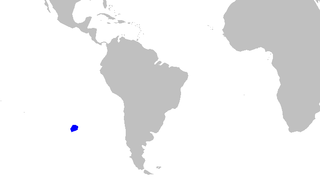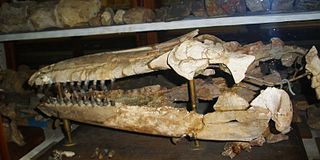
Oligodon is genus of colubrid snakes that was first described by Austrian zoologist Leopold Fitzinger in 1826. This genus is widespread throughout central and tropical Asia. The snakes of this genus are commonly known as kukri snakes.

The banded kukri snake, russet kukri snake, or common kukri snake,, is a species of nonvenomous colubrid found mainly in South Asia.
Oligodon cyclurus is a species of snake found in Asia. It was first described by Theodore Cantor in 1839.

The streaked kukri snake is a species of nonvenomous snake found in Asia. It is also known as the variegated kukri. The IUCN lists the species as least concern.
Oligodon nikhili, known commonly as Nikhil's kukri snake, is a species of snake in the family Colubridae. The species is endemic to the Palni Hills of southern India.

Oligodon cinereus, the ashy kukri snake or Günther's kukri snake, is a species of snake in the family Colubridae.
Scymnodalatias is a genus of squaliform sharks in the family Somniosidae.

The sparsetooth dogfish is a very rare sleeper shark of the family Somniosidae, the holotype of which was taken in the subtropical southeast Pacific at a depth of up to 200 m. Its biology is unknown.

The Katarniaghat Wildlife Sanctuary is a protected area in the Upper Gangetic plain, near Bahraich city in Bahraich district of Uttar Pradesh, India and covers an area of 400.6 km2 (154.7 sq mi) in the Terai of the Bahraich district. In 1987, it was brought under the purview of the Project Tiger, and together with the Kishanpur Wildlife Sanctuary and the Dudhwa National Park it forms the Dudhwa Tiger Reserve. It was established in 1975.

Hemisyntrachelus is an extinct genus of cetacean.
Oligodon calamarius is a species of nonvenomous colubrid endemic to Sri Lanka. It is known as කබර දත්-කැටියා in Sinhala.
Oligodon ancorus, commonly known as the northern short-headed snake, is a species of colubrid snake found on the islands of Luzon and Mindoro in the Philippines, as well as the island of Sumatra in Indonesia. However, whether the populations from Sumatra, described as Oligodon rhombifer, belong to this species has been contested.
Oligodon annamensis, commonly known as the Annam kukri snake or Leviton’s kukri snake, is a species of colubrid snake originally known from two specimens from Vietnam, where it was thought to be endemic. It has also since been found in Cambodia and Thailand.
Oligodon annulifer, also known as the ringed kukri snake, is a colubrid snake endemic to the island of Borneo.

The eight-striped kukri snake, eight-lined kukri snake, or Grace's kukri snake is a species of snake of the family Colubridae.
Oligodon lacroixi, commonly known as the Lacroix kukri snake, is a species of snake in the subfamily Colubrinae of the family Colubridae. The species is native to Southeast Asia.

Oligodon mouhoti, also known as the Cambodian kukri snake or Mouhot's kukri snake, is a species of snake of the family Colubridae. It was named for French naturalist Henri Mouhot.

Oligodon churahensis, the Churah Valley kukri snake, is a species of snake in the family Colubridae. It was discovered when a photo of it was posted in Instagram and noticed by two biologists, leading to them contacting the poster and collecting specimens of the species. It is known only from the state of Himachal Pradesh in India. The common and specific name both refer to the Churah Valley, where it was discovered.

Oligodon russelius, commonly known as Russell's kukri snake is a species of snake in the family Colubridae. The species is very closely related to Oligodon arnensis, from which it has been recently separated. The specific epithet honours the British herpetologist Patrick Russell, one of whose illustrations possibly depicts this species.










